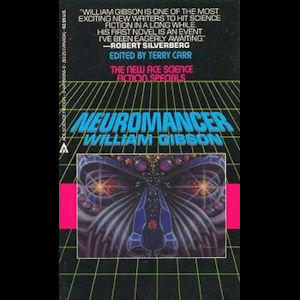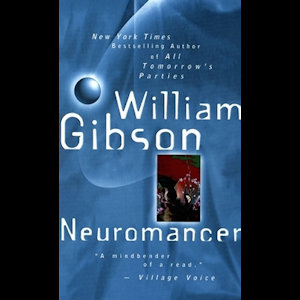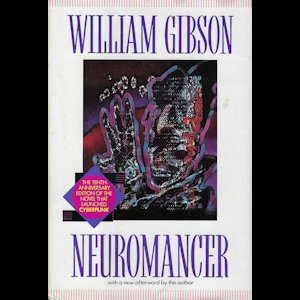Neuromancer by William Gibson - Sci-Fi Classic Review
 | | The classic cover design |
Case was a digital cowboy who got burned out of cyberspace when he took his hack a little too far. Now he stalks the dingy streets of crime-ridden Chiba, selling black market RAM, jittering on the edge of a serious speed addiction, and aiming to get himself killed to end the suffering. Just when he thinks death has found him, he is recruited by an enigmatic figure who cures his industrial brain damage and puts him back on the superhighway for an impossible job involving two competing A.I.s. Case travels the world and beyond, and he is joined by a razor-fingered samurai who offers both sex and protection and a man who can project illusions as easily as he can smile.
This is William Gibson's seminal breakout novel, Neuromancer, a work widely credited with launching the entire genre of cyberpunk. Gibson mixes equal parts Philip Dick's psychofuturism and Dashiell Hammett's hard-boiled linguistic flair to bring something genuinely new to the world of science-fiction in the early 1980's. While Neuromancer isn't technically the first work of cyberpunk out there (not even the first published work of cyberpunk by Gibson), it is certainly the most influential of the genre's roots, inspiring popular works like The Matrix, Snow Crash, and Ready Player One. (It is often claimed that Ghost in the Shell was also inspired by Neuromancer, but the evidence for this claim is practically nonexistent; the two properties likely developed independantly.)
Though its conception of cyberspace as a three-dimensional, visual space you traverse in virtual reality feels pretty dated from the perspective of the Twenty-First Century, it was the definitive prediction of sci-fi at the time, never truly falling away from popular culture even as the Internet turned out to be a different beast. That said, it is hard to believe how much Gibson got right about the digital future, and it is hard to fathom how readers in 1984--the year Neuromancer was published--understood even a third of what Gibson was writing about.
Still, the free-flowing style of Gibson's words is hypnotic enough to get readers through, even if they don't understand what's happening on the page. I first read it when I was a mere ten years old, and I'm pretty sure I didn't comprehend any of it, not that that stopped me from falling in love with it. (Yeah, I was reading things like Neuromancer when I was ten. What can I say? I was a precocious reader.) The style is not perfectly analogous to Dashiell Hammett's, but it definitely shares a similar philosophy of revealing tightly focused details rather than painting a full picture of a scene. Gibson punctuates this with a lot of technobabble and choppy sentence fragments, taking Hammett's poetic realism and morphing it into something more akin to a stream-of-consciousness impressionism.
 | | The classy cover design |
This works for the subject matter, because Neuromancer dives deep into the nature of consciousness, perception, and how we interface with both reality and digital constructs. It deals with heady philosophical questions of identity--like Dick's best works--alongside deeply technical, prophetic interpretations of future technology. If written in a standard, natural style, it would be obtuse and dull, no matter how interesting the action gets. However, Gibson finds a way to cut through it, not by dismissing the details, but by plowing through them without elaboration, leaving readers to either accept the speed of the ride or get off.
At its core, buried beneath all the punkiness and philosophical posturing, it's actually a fairly standard heist story. Our protagonist is a failed criminal offered a chance to get back into the game for one last big score, and we watch as his team is assembled and forced to work together even as they question each other and prepare for the inevitable betrayals as they approach an endgame none of them fully understand. (The exact same thing could be said of The Matrix, by the way, a film so obviously inspired by Neuromancer you'd expect "the matrix" to be a plot point in the latter... which it totally is.)
However, it's not the kind of fun, entertaining ride you'd expect from that description. It's much darker than, say, Ocean's 11, full of grime, sex, casual murder, rampant drug abuse, and a protagonist who, while not completely irredeemable, is at the very least a noir-esque anti-hero. While few writers have improved upon Neuromancer's underlying ideas, there are plenty of works out there with more relatable characters.
Of course, with at least one character, the Razorgirl Molly Millions (who also appears in "Johnny Mnemonic" and Mona Lisa Overdrive), Gibson creates a new archetype: the leather-clad, partially modified, sexually charged badass female warrior who acts as both secondary protagonist and femme fatale. (Feel free to draw your comparisons to Major Kusanagi, but remember Ghost in the Shell was probably not influenced by Neuromancer.) She is vastly more compelling than Case, but it makes sense that she's not the P.O.V. character, because her enigmatic motives are a critical aspect.
 | | Scanned this one myself from my hardback |
Speaking of which, Gibson finds a unique way around the omniscient point of view. Neuromancer is told entirely from the third-person perspective of Case, but through technological wizardry, Case is able to "flip" into Molly's head and experience events as she experiences them, without being able to know what she's thinking or feeling aside from pleasure or pain. This not only gives Gibson a clever way to include events outside of Case's frame of reference, but it makes Case's relationship with Molly more intimate and intriguing, which in turn makes their romantic subplot more believable.
One thing I will criticize Gibson for: he should never have explained the mystery of that three-syllable word during the book's climax. If you've read it, you know what I'm talking about, and if you don't know what Gibson's answer is, I implore you not to look it up; it's deeply disappointing.
There have been multiple attempts to bring Neuromancer to the silver screen (the most recent involving Deadpool's Tim Miller in the director's chair), and though I'd love to see it happen, I'm not sure it's such a good idea right now. Casual audiences unfamiliar with the source material would probably find it derivative and dated, a throwback to 1990's sci-fi cheese (like the cult-admired but obviously bad Johnny Mnemonic) that would ironically be accused of ripping off The Matrix. It would take some serious ingenuity to keep it fresh enough to be successful, especially as it would require a hefty budget. (There's also a classic PC game from 1988 by Interplay and funded by none other than Timothy Leary, but I can't get it to work properly on my machine as of the time of this writing, so don't expect a review any time soon.)
In the final analysis, though, Neuromancer remains a fascinating read and a titan of the cyberpunk genre. Many seminal works like it tend to be overshadowed by what comes after, but Neuromancer has never been completely overthrown. As sci-fi goes, it's definitely one of the most important novels of the 1980's, and even though Gibson is still alive and active (with Pattern Recognition standing out as a masterwork in its own right), his first novel deserves the title of "classic."
-e. magill 11/8/2018
|
|